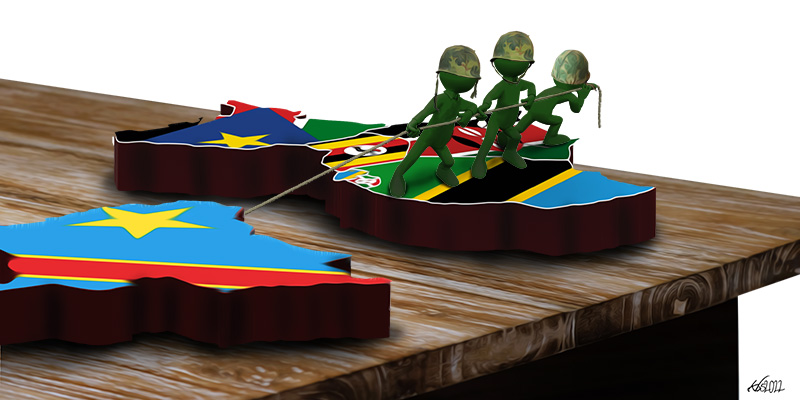The current members of the East African Community (EAC) are Tanzania, Kenya, Uganda, Rwanda, Burundi, and South Sudan. The Somali Federal Government, under the leadership of Hassan Sheikh Mohamud, has expressed a strong interest in joining the EAC, sparking questions among Somali citizens as to whether the country is ready to join such a large and complex regional bloc.
During President Hassan Sheikh Mohamud initiated Somalia’s pursuit of EAC membership during his previous term as a president from 2012 to 2017. However, little progress was made during his first term and, following his re-election, President Hassan reignited his pursuit of EAC membership without consulting essential stakeholders such as the parliament, the opposition, and civil society. This unilateral decision has raised doubts about the president’s dedication to establishing a government based on consensus. Moreover, his decision to pursue EAC membership has evoked mixed responses within Somalia. While some Somalis perceive joining the EAC as advantageous for the country, others express concerns about potential risks to Somalia’s economic and social development. President Hassan has defended his decision, emphasising that Somalia’s best interests lie in becoming a member of the EAC.
To assess Somalia’s readiness to join the EAC, the regional bloc undertook a comprehensive verification mission. A team of experts well versed in politics, economics, and social systems, was tasked with evaluating Somalia’s progress. The evaluation included a thorough review of economic performance, trade policies, and potential contributions to the EAC’s integration efforts. During this process, the team engaged with various government institutions and private organisations, conducting comprehensive assessments and discussions to gauge Somalia’s preparedness.
One of the key requirements for Somalia is demonstrating an unwavering commitment to upholding principles such as good governance, democracy, the rule of law, and respect for human rights. Somalia must also showcase a vibrant market economy that fosters regional trade and collaboration.
Successful integration into the EAC would not only elevate Somalia’s regional stature but would also foster deeper bonds of cooperation and shared prosperity among the East African nations. While this is a positive step towards regional integration and economic development, there are several reasons for pessimism about the potential success of Somalia’s membership in the EAC.
Somalia must also showcase a vibrant market economy that fosters regional trade and collaboration.
Somalia has faced significant challenges due to prolonged conflict and instability. The decades-long civil war, coupled with the persistent threat of terrorism, has had a devastating impact on the country’s infrastructure, economy, governance systems, and overall stability.
The following fundamental factors raise valid concerns about Somalia’s readiness to effectively participate in the EAC.
Infrastructure development
Infrastructure plays a critical role in regional integration and economic growth. However, Somalia’s infrastructure has been severely damaged and neglected due to years of conflict. The country lacks adequate transportation networks, reliable energy systems, and while communications infrastructure has improved, internet penetration rates remain low and mobile networks – which are crucial for seamless integration with the EAC – can be unavailable outside of urban centres. Rebuilding such infrastructure requires substantial investments, technical expertise, and stability, all of which remain significant challenges for Somalia.
Political stability and governance
The EAC places emphasis on good governance, democracy, and the rule of law as prerequisites for membership. Somalia’s journey towards political stability and effective governance has been arduous, with numerous setbacks and ongoing power struggles. The lack of a unified government, coupled with weak state institutions and a history of corruption, raises doubts about Somalia’s ability to meet the EAC’s standards. Without a stable and inclusive political environment, Somalia may struggle to effectively contribute to the decision-making processes within the regional bloc.
Economic development and trade
Somalia’s economy has been heavily dependent on the informal sector and faces substantial economic disparities. The country needs to demonstrate a vibrant market economy that fosters regional trade and collaboration, as required by the EAC. However, the challenges of rebuilding a war-torn economy, tackling high poverty rates, and addressing widespread unemployment hinder Somalia’s ability to fully participate in regional trade and reap the benefits of integration.
Security Concerns
Somalia continues to grapple with security challenges, including the presence of extremist groups and maritime piracy. These issues have not only hindered the country’s development but also pose potential risks to the stability and security of the entire EAC region. It is crucial for Somalia to address these security concerns comprehensively and to establish effective mechanisms to contribute to the EAC’s collective security efforts.
Economic Disparity and Compatibility
Somalia’s economy primarily relies on livestock, agriculture, and fishing, which may not align well with the more quasi-industralised economies of the other EAC member states. This mismatch could result in trade imbalances and pose challenges for integrating Somalia into the regional economy. For instance, according to the World Bank, Somalia’s GDP per capita was US$447 in 2021 whereas it is US$2081 for Kenya, US$1099 for Tanzania, and US$883 for Uganda. Furthermore, Somalia faces significant economic challenges, including capital flight that drains resources from the country, contributing to its status as a consumer-based economy.
This divergence in economic structures could lead to trade imbalances and impede the seamless integration of Somalia into the regional economy. The substantial economic gap between Somalia and other EAC member states suggests a significant disparity that may hinder Somalia’s ability to fully participate in the EAC’s economic activities. Additionally, Somalia has yet to demonstrate fiscal or economic discipline that would make it eligible for EAC membership. While Somalia has a functioning Central Bank and the US dollar remains the primary mode of financial transactions, the risk of integration lies with the other EAC members; cross-border trade would occur in an environment of instability, posing potential risks to the other member state.
Somalia faces significant economic challenges, including capital flight that drains resources from the country, contributing to its status as a consumer-based economy.
While these fundamental challenges remain, it is important to acknowledge the progress Somalia has made in recent years. This includes the gradual improvement in security conditions, the establishment of key governmental institutions, and the peaceful transfer of power. One can also argue that many of these fundamental economic, infrastructure, political instability, and security concerns exist across the East African Community. However, what makes Somalia unique is the scale of the challenges it faces today. Somalia has adopted a federal political structure, which has not worked well so far. This level of fragmentation and civil political distrust makes Somalia’s case unique. More than ever, Somalia needs meaningful political and social reconciliation before it can embark on a new regional journey.
The absence of an impact assessment by the relevant ministries in Somalia is alarming. Without this assessment, it becomes challenging to make informed decisions about the potential benefits of joining the EAC and the impact on our economy and society. Conducting this assessment should be a priority for Somalia’s ministries to ensure a comprehensive evaluation of the potential benefits and risks involved in EAC membership. Furthermore, President Hassan Sheikh Mohamud’s decision to pursue Somalia’s integration into the EAC lacks political legitimacy as a decision of this nature would normally require ratification through a popular vote and other legal means through parliament. The failure to achieve this could potentially allow another president in the future to unilaterally announce withdrawal from the EAC.
Fragile state of Affairs and internal disputes
The recent reopening of the Gatunda border post between Uganda and Rwanda after a three-year period of strained relations indicates a fragile state of affairs. The East African Court of Justice has ruled that Rwanda’s initial closure of the border was illegal, highlighting the contentious nature of inter-country disputes. Furthermore, Tanzania and Uganda have formally lodged complaints against Kenya, alleging unfair advantages in trade relations, and have even gone as far as threatening Kenya with export bans. These grievances underscore the underlying tensions and competition between member states, which could potentially hinder the harmonious functioning of the East African Community. These political and economic disagreements among member states increase the risks associated with Somalia’s membership. Somalia must carefully evaluate whether it is entering a united and cohesive bloc or one plagued by internal divisions. Joining the East African Community at this juncture carries the risk of being drawn into ongoing disputes and potentially being caught in the crossfire of inter-country rivalries.
Conflict in South Sudan
The prolonged conflict in South Sudan, which has been ongoing since its admission to the East African Community (EAC) in 2016, serves as a cautionary tale for Somalia. Despite the EAC’s efforts to mediate and foster peace in the region, the outcomes have been mixed, resulting in an unsustainable peace. This lack of success highlights the challenges faced by member states in resolving conflicts and maintaining stability within the community. Somalia must carefully evaluate whether its participation in the EAC will genuinely contribute to its stability, economic growth, and development, or if it risks exacerbating existing internal conflicts. Joining the community without a solid foundation of political stability, institutions, and peace could potentially divert resources and attention away from domestic issues, hindering Somalia’s progress towards resolving its own challenges. South Sudan’s admission to the EAC in 2016 was seen as a major step towards regional integration and stability. However, the country has been mired in conflict ever since, with two civil wars breaking out in 2013 and 2016. The EAC has been involved in mediation efforts, with mixed results.
Assessing Readiness
Somalia must evaluate the readiness of its institutions, infrastructure, and economy to effectively engage with the East African Community. Comprehensive preparations are crucial to ensure that joining the community is a well thought-out and strategic decision, rather than a hasty move that could further destabilise the nation. Somalia needs to assess whether its infrastructure, institutions, and economy are sufficiently developed to cope with the challenges and demands of integration. Premature membership could strain Somalia’s resources, impede its growth, and leave it at a disadvantage compared to more established member states.
Somalia must carefully evaluate whether it is entering a united and cohesive bloc or one plagued by internal divisions.
Somalia must ensure sustained progress in stability, infrastructure development, governance, and economic growth before considering full membership of the EAC. A phased approach that prioritises capacity building, institution-strengthening, and inclusive governance would enable Somalia to lay a solid foundation for successful integration and reap the maximum benefits from EAC membership in the long term. Failure to address these concerns would make Somalia vulnerable to exploitation and market monopolies by stronger economies, and could also risk a lack of seamless convergence for Somalia’s membership. While there is political will from EAC leaders to support Somalia’s membership, it is vitally important that they make the right decision for Somalia and the EAC bloc as a whole to ensure a successful integration. I believe that, at this juncture, the disadvantages of Somalia joining the EAC outweigh the benefits.








